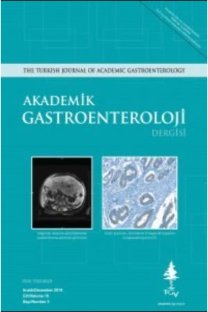Total larenjektomi uygulanmış veya organ koruma protokolüne alınmış hastalarda yaşam kalitesi ve konstipasyon
Quality of life and constipation in patients undergoing total laryngectomy and organ preservation protocol
___
- 1. Babin E, Blanchard D, Hitier M. Management of total laryngectomy patients over time: from the consultation announcing the diagnosis to long term follow-up. Eur Arch Otorhinolaryngol 2011;268:1407-19.
- 2. Palit S, Lunniss PJ, Scott SM. The physiology of human defecation. Dig Dis Sci 2012;57:1445-64.
- 3. Sanabria A, Sanchez D, Chala A, Alvarez A. Quality of life in pa-tients with larynx cancer in Latin America: Comparison between laryngectomy and organ preservation protocols. Ear Nose Throat J 2018;97:83-90.
- 4. Belsey J, Greenfield S, Candy D, Geraint M. Systematic review: im-pact of constipation on quality of life in adults and children. Ali-ment Pharmacol Ther 2010;31:938-49.
- 5. Werth BL, Williams KA, Fisher MJ, Pont LG. Defining constipation to estimate its prevalence in the community: results from a national survey. BMC Gastroenterol 2019;19:75.
- 6. Schmidt FM, de Gouveia Santos VL, de Cassia Domansky R, Neves JM. Constipation: Prevalence and associated factors in adults living in Londrina, Southern Brazil. Gastroenterol Nurs 2016;39:204-11.
- 7. Van Lancker A, Velghe A, Van Hecke A, et al. Prevalence of symp-toms in older cancer patients receiving palliative care: A systematic review and meta-analysis. J Pain Symptom Manage 2014;47:90-104.
- 8. Genz H, Jenetzky E, Hauer K. Palliative geriatrics. What are the dif-ferences between oncologic and non-oncologic palliative geriatric inpatients? Z Gerontol Geriat 2010;43:369-75.
- 9. Laugsand EA, Jakobsen G, Kaasa S, Klepstad P. Inadequate symp-tom control in advanced cancer patients across Europe. Support Care Cancer 2011;19:2005-14.
- 10. Ugur SS, Yuksel S, Coskun BU, et al. Does lack of glottic closure affect quality of life as a cause of constipation in laryngectomized patients? Eur Arch Otorhinolaryngol 2013;270:629-34.
- 11. Bjordal K, Ahlner EM, Tolleson E, et al. Development of a European Organization for Research and Treatment of Cancer (EORTC) ques-tionnaire module to be used in quality of life assessments in head and neck cancer. EORTC Quality of Life Study Group. Acta Oncol 1994;33:879-85.
- 12. Singer S, Wollbrück D, Wulke C, et al. Validation of the EORTC QLQ‐C30 and EORTC QLQ‐H&N35 in patients with laryngeal cancer after surgery. Head Neck 2009;31:64-76.
- 13. Drossman DA, Dumitrascu DL. Rome III: New standard for function-al gastrointestinal disorders. J Gastrointestin Liver Dis 2006;15:237-41. 14. Aaronson NK, Ahmedzai S, Bergman B, et al. The European Organ-isation for Research and Traetment of Cancer QLQ-C30: a quali-ty-of-life instrument for use in international clinical trials in oncolo-gy. J Natl Cancer Inst 1993;85:365-76.
- 15. Fayers PM, Aaronson NK, Bjordal K, et al. On behalf of the EORTC Quality of Life Group. The EORTC QLQ-C30 Scoring Manual (3rd ed.). Published by: European Organisation for Research and Traet-ment of Cancer, Brussels, 2001.
- 16. Saltürk Z, Arslanoğlu A, Özdemir E, et al. How do voice restoration methods affect the psychological status of patients after total lar-yngectomy? HNO 2016;64:163-8.
- 17. Eadie TL, Otero D, Cox S, et al. The relationship between communi-cative participation and postlaryngectomy speech outcomes. Head Neck 2016;38(Supll 1):E1995-61.
- 18. Dragicevic D, Jovic RM, Kljajic V, Vlaski L, Savovic S. Comparison of Voice Handicap Index in patients with esophageal and tracheo-esophageal speech after total laryngectomy. Folia Phoniatr Logop 2019;27:1-7.
- 19. Moukarbel RV, Doyle PC, Yoo JH, et al. Voice-related quality of life (V-RQOL) outcomes in laryngectomees. Head Neck 2011;33:31-6.
- 20. van Sluis KE, van der Molen L, van Son RJ, et al. Objective and subjective voice outcomes after total laryngectomy: a systematic review. Eur Arch Otorhinolaryngol 2018;275:11-26.
- 21. Singer S, Amdal CD, Hammerlid E, et al; EORTC Quality of Life and the EORTC Head and Neck Cancer Groups. International validation of the revised European Organisation for Research and Treatment of Cancer Head and Neck Cancer Module, the EORTC QLQ‐HN43: Phase IV. Head Neck 2019;41:1725-37.
- 22. Schmulson MJ, Drossman DA. What is new in Rome IV. J Neurogas-troenterol Motil 2017;23:151-63.
- 23. Larkin PJ, Cherny NI, La Carpia D, et al; ESMO Guidelines Com-mittee. Diagnosis, assessment and management of constipation in advanced cancer: ESMO Clinical Practice Guidelines. Ann Oncol 2018;29:iv111-iv125.
- 24. Davies A, Leach C, Caponero R, et al. MASCC recommendations on the management of constipation in patients with advanced cancer. Support Care Cancer 2019. doi: 10.1007/s00520-019-05016-4. Epub ahead of print.
- ISSN: 1303-6629
- Yayın Aralığı: 3
- Başlangıç: 2002
- Yayıncı: Jülide Gülay Özler
Outbreak of hepatitis C virus infection in hemodialysis unit
Bengü TATAR, ŞÜKRAN KÖSE, Murat SAYAN
Mustafa Zanyar AKKUZU, Orhan SEZGİN, Serkan YARAŞ, Osman ÖZDOĞAN, Enver ÜÇBİLEK, Engin ALTINTAŞ, Fehmi ATEŞ, Tuba KARA, Mustafa BERKEŞOĞLU
Vitamin D reseptör ekspresyonunun kolorektal kanserlerde evre ile ilişkisi ve prognoz üzerine etkisi
Mehmet Sezgin PEPELER, Berna SAVAŞ, Merve PAMUKÇUOĞLU, Murat TÖRÜNER, Hakan AKBULUT
MUSTAFA ZANYAR AKKUZU, Orhan SEZGİN, OSMAN ÖZDOĞAN, SERKAN YARAŞ, Enver ÜÇBİLEK, Engin ALTINTAŞ, Fehmi ATEŞ, Tuba KARA, MUSTAFA BERKEŞOĞLU
Firdevs TOPAL, Sabiye AKBULUT, Fatih Esad TOPAL, Şebnem KARASU
Hemodiyaliz ünitesinde hepatit C virüsü enfeksiyonu salgını
Murat SAYAN, Bengü TATAR, Şükran KÖSE
Yeni Tanı Almış Çölyak Hastalarında Tanı Anında Karaciğer Fonksiyon Testlerinin Analizi
Mehmet Sezgin PEPELER, Berna SAVAŞ, Merve PAMUKCUOĞLU, Murat TÖRÜNER, Hakan AKBULUT
